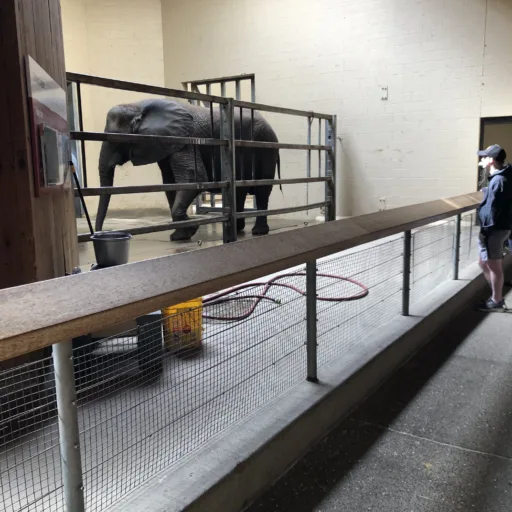
Tasha
Pittsburgh Zoo & Aquarium (Pittsburgh, PA)
Tasha has spent close to half a century in captivity—her life marked by exploitation, unnatural conditions, and the systematic stripping away of her autonomy. Born around 1976, living freely with her familial herd in South Africa, Tasha was taken from her home and family as a young calf. In 1979, she was imported to the United States and thrust into a life of captivity and suffering. She is currently held captive at the Pittsburgh Zoo & Aquarium in Pittsburgh, PA. Tasha and the other elephants confined with her all suffer from the facility’s lack of sufficient space and from being unable to engage in their natural behaviors.
Natasha, also known as Tasha, has spent close to half a century in captivity—her life marked by exploitation, unnatural conditions, and the systematic stripping away of her autonomy. Born around 1976, living freely with her familial herd in South Africa, Tasha was taken from her home and family as a young calf. In 1979, she was imported to the United States and thrust into a life of captivity and suffering.
Tasha arrived at the Pittsburgh Zoo in 1982, where she has remained for over 40 years. Despite the zoo’s claim that it provides a naturalistic environment, the Pittsburgh Zoo provides less than an acre of outdoor space to Tasha and the other elephants she is confined with. In the cold, winter months they are often confined to a barren, industrial barn that has concrete flooring.
Tasha has never known freedom. She has been confined to enclosures that fail to meet her species’ most basic needs—freedom of movement, companionship with a stable herd, complex stimulation, and expansive space. Instead, her world has been limited to concrete, fences, and human control. Tasha has been observed engaging in stereotypic behaviors—repetitive movements caused by chronic stress and psychological trauma that has never been observed in wild populations. She has also been seen frequently lifting her feet, likely as a way to relieve pressure from joints after standing on hard surfaces for most of the day.
The Pittsburgh Zoo has long been criticized by animal advocates and experts for its treatment of elephants. In 2015 the zoo was cited by the USDA for its use of dogs to herd the elephants, which it had been doing since at least 2012. That same year, the zoo voluntarily relinquished its accreditation by the Association of Zoos and Aquariums (AZA) because it did not want to comply with the AZA’s new standards of care and handling for elephants. Specifically, the zoo intended to continue use of bullhooks and employ free contact management style. The zoo has been included on In Defense of Animals’ “10 Worst Zoos for Elephants in North America” list three times, in 2016, 2017, and 2020.
Like other elephants held in U.S. zoos, Tasha is used as a living exhibit under the guise of education and conservation. Yet there is no conservation benefit to keeping elephants like Tasha in captivity. Her removal from the wild did not protect her species—it deprived her of her freedom and doomed her to decades of confinement.
Tasha’s life is a sobering reflection of the failings of captivity. She deserves more than a concrete enclosure and barren yard. She deserves the chance to experience peace, space, and dignity. The Pittsburgh Zoo should transfer Tasha to an accredited elephant sanctuary where she can live out her remaining years in a peaceful environment that can meet her complex needs. After nearly five decades in captivity, she deserves freedom of choice over her life.
Take action today
A future where no elephant has to endure the traumas of being torn from their families and natural habitats, bred against their will, and shipped from zoo to zoo is possible, and we need your help to make it a reality.
Submit Information
Do you have a tip for us? The Free to be Elephants project relies on our supporters to keep us up-to-date with the latest news, updates and photos about elephants in their local facilities. Use this form to submit your info and help us expose the reality of elephant captivity across America.